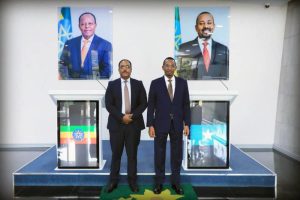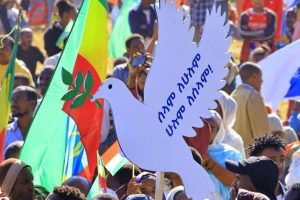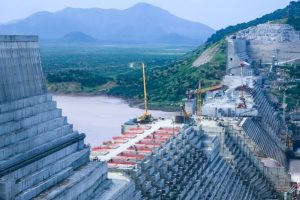It is clear that any activity in a country cannot be imagined and carried out without reliable peace and stability. Peace is a ‘sine qua non’, for any development activities because no one would risk their capital and investment in a country where there is an atmosphere of uncertainty and doubts for their security and welfare. If there are violent activities in an area, that place is destined to be dismissed from the list of potential zones of investment and commerce by huge business groups. In countries where peace is precarious, interest in those places is pushed back because investors give priority to their safety and any risks in this regard are to them unsustainable and unacceptable.
On the other hand, where there is reliable peace and security, that place becomes an attractive place for all kinds of investment depending on several other preconditions such as the legal framework that governs investments, the availability of cheap labor and manpower, the crucial energy that is available to run the investment and the space and infrastructure that are indispensable for any kind of industrial and manufacturing activity to be embarked upon. The way the taxation is run is also another factor that adds up to the incentive for the big investors ready to engage in long-term activities.
Currently, one can say Ethiopia has updated these preconditions such as space where investment could be carried out. It can provide the ideal condition of enough human labor because it has immense youths who are ready to engage in every undertaking. Energy-wise, Ethiopia is now a huge producer of clean hydropower that would contribute to fighting climate change fulfilling the conditions of limiting gas emissions to the atmosphere. The Grand Ethiopian Renaissance Dam, GERD, is in this sense a huge development that may even contribute to the scarcity of power to neighboring countries after filling the gap in the provision of power needed to any potential investor. Infrastructure-wise, there are now huge and remarkable developments in Ethiopia with new roads and highways being constructed and old ones repaired and maintained to be up to current standards. The newly built railroad network that was realized in collaboration and support of the Chinese government and companies has become a plus for the easier and cheaper movement of goods and supplies imported from foreign lands and a gateway for export activities.
Ethiopia is also an attractive place in terms of climatic conditions with moderation in every season throughout the year. There are no extreme weather conditions with a big part of the year being stable and warm and ventilated, unlike many other zones in Africa and elsewhere in the developing world. In terms of the legal framework and the way the government treats these would-be investors, there has been lately a lot of progress made with the recent restructuring of the bureaucracy by the government’s relentless search for a speedy facility for investors not to take too much precious time with red tape. It was found out that in the past the slow-moving bureaucracy was a discouragement for potential investors in the country.
That is why today many of the conditions for issuing investment licenses and formalities to be fulfilled have been limited to a one-stop facility and arrangement easing the entire operation. Investors now do not have to waste their precious time and resources trying to secure a license or permit to embark on their projects and plans. In this sense, the legal framework has been well improved so that investors can feel comfortable in launching their endeavors. What should not be forgotten is also the cheap labor Ethiopia can avail to potential investors.
Nowadays, Ethiopia is being elevated to becoming a preferable destination for investment. The country is also improving its economic status with continuous economic growth and an increase in its GDP. Now Ethiopia is rated by economic parameters as the biggest economy in the East African region and the fourth largest economy in the entire continent. If current trends continue, it will soon reach the status of one of the medium economic realities of the world. It is good to see that things seem to proceed well despite certain challenges to be overcome sooner than later.
The government has said that the newly introduced Home Grown Economic Reform Program has prevented the country’s economy from falling into potential chaos and breakdown of the banking system. The floating of the hard currencies exchange market rate has been considered a long overdue development and welcomed by international financial institutions because they say the local currency has long been overrated and this has led to the illegal parallel market that affected the foreign currency reserves. This development is expected to be more attractive for investors even if many economists have expressed their reservations against this move which has contributed, at least in the short run, to more inflationary tendencies as the Birr’s value has been diminished. This has affected most of the low-income circles of the population before the potential future benefits the government has been talking about can be realized.
The government has also repeatedly vowed to fight this huge challenge of inflation by controlling it through the introduction of several fiscal and monetary policies. The government has remarked that unfortunately inflation is a worldwide phenomenon and presents a huge challenge to every country.
Despite the presence of all the above comfortable conditions to follow up with the development trajectory of the economy, what has endangered the entire process is the uncertainty that certain armed groups have been creating in certain areas with sporadic disruption in the smooth movement of people and goods. Even the perception of such a situation has become a point of relief and joy for those who do not want to see Ethiopia become an influential and important country in the African geopolitical scene.
It is evident that Ethiopia is growing fast and trying to assume the position it deserves with all the historical background it avails, the cultural heritage it shows to the world, and the present generation of citizens who may not be well informed about their forefathers’ history. Its reputation and position as the beacon of Pan Africanism and freedom as well as a vanguard in the struggle for the liberation of Africans from colonialism contributes to that image as well. What is more, Ethiopia is also reputed for being the ‘land of origin’ where the oldest human species has been discovered by paleontologists. The history of the struggle against colonialism in Africa is mainly associated with Ethiopia. For all these points and the fact that Ethiopia has a huge population of more than 120 million completes the circle. This means the availability of a huge market is guaranteed provided the economy continues to grow at the current pace.
In the meantime, however, we risk losing all these advantages for growth and investment if we do not guarantee and conserve peace in every corner of the country. This is and remains a huge handicap for any healthy development in the country. That is why the government has given it maximum priority and continues to invite all those armed groups that say they have issues with the government that they would like to be addressed immediately. The government says it has created the ideal conditions to face the issue and deal with it with utmost urgency by preparing the groundwork to conduct peace talks around a table.
The formation of the National Dialogue Commission can be taken as one of the efforts of the government to attain full peace embracing all the parties that are ready and willing to engage in discussions within this Commission. The assemblies and rallies that, the public was engaged in during the past days and weeks are other testimonies to the desire and anxiety of the public to do away with hostilities and violence in every part of the country and enjoy the benefits of permanent peace. The government has vowed that its efforts to bring to the table all parties that still believe that they can solve the problems of the country by engaging in armed struggle should put down their guns and abandon the violent ways and engage in open and frank talks in an atmosphere of good faith and utmost responsibility, and without posing any preconditions.
We are in a world where negotiations and peace talks are the order of the day and resorting to the use of force rather than reason and logic has not yielded any fruits. Moreover, we all know what violence and wars can result in. We have to learn from our own experience of the past few years alone. We have lost lots of resources, both human and material and we have dealt a tremendous blow to the country’s economy just because we preferred the way of conflicts rather than the way of peaceful talks and ironing out our discrepancies.
Peace is clearly a diplomatic product of compromises and sacrifices but not protracted wars and conflicts. The experiences of the twentieth century must convince us to refrain from adopting outmoded manners of fulfilling our needs and wishes no matter how right we may be or have many claims.
In an atmosphere where there is space for peaceful discussions with guarantees of security for all parties that are involved in the talks by neutral observers such as the UN, the AU, and the EU or any other credible body, it should not be very difficult to sit down around a table and discuss the controversial issues in an open-minded manner, ready to compromises and sacrifices for the greater good. Undoubtedly, our destinies are intertwined and we cannot live by doing away with the other peoples of Ethiopia in an atmosphere of inequality and oppression.
The main advantage of a democracy is that everyone has a chance of a shot in affairs that matter to them. The government says it has no problems with guaranteeing such rights to all without any preconditions or discrimination. As long as we continue to stage intestinal fights and controversies, it is clear that we cannot attain our economic ambitions and objectives and that would be a huge failure to our citizens.
There are no alternatives to peace and stability for a country that tries to grow fast and fulfill the needs of its population. That is why the government insists that we should all work hard to resolve our differences peacefully and not by using guns and bombs against each other. All stakeholders are invited to put their pressure on those who do not want to divorce from violence and warfare and engage in peace talks.
BY FITSUM GETACHEW
THE ETHIOPIAN HERALD TUESDAY 24 DECEMBER 2024




